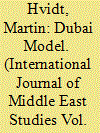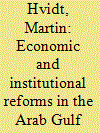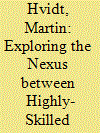|
|
|
Sort Order |
|
|
|
Items / Page
|
|
|
|
|
|
|
| Srl | Item |
| 1 |
ID:
090266


|
|
|
|
|
| Publication |
2009.
|
| Summary/Abstract |
The developmental process as it unfolds in Dubai has hardly been analyzed by academics. Most current knowledge about the country originates from media coverage, especially from news magazines and business literature. Recently a number of social science based but historically oriented academic publications have appeared. Only one study, however, has seriously sought to place Dubai in a broader developmental framework: Sampler and Eigner's From Sand to Silicon, published in 2003. Yet, by applying the so-called strategic trajectory model to the case of Dubai, they reduce their focus to the management side. Their aim is too narrow to provide an explanation of the overall development process in Dubai.
|
|
|
|
|
|
|
|
|
|
|
|
|
|
|
|
| 2 |
ID:
102017


|
|
|
|
|
| Publication |
2011.
|
| Summary/Abstract |
Over the last decades, Dubai has applied an economic developmental model which is strongly pro-business, emphasizes market liberalism and economic openness, and embraces globalization, while at the same time refraining from challenging the traditional neo-patrimonial leadership structure in the country. As such, the "Dubai model" has so far been distinctly different from economic models applied in the other GCC countries. However, judging from official statements, development projects under implementation, and the effort currently expended in creating economic assets in the other GCC states, these states seem to be embracing the "Dubai model" of development. This article will analyze the claim that the "Dubai model" is displacing the rentier state model as the general developmental model among the Gulf countries.
|
|
|
|
|
|
|
|
|
|
|
|
|
|
|
|
| 3 |
ID:
169446


|
|
|
|
|
| Summary/Abstract |
This article explores the nexus between immigration of highly-skilled persons and economic growth in the Arab Gulf states, until now a significantly understudied topic. It is argued that long-term growth primarily stems from technological progress and the article conducts a qualitative analysis of the degree to which the group of highly skilled migrants contributes to technological progress. The paper focusses on the United Arab Emirates (UAE) but reflects general issues pertaining to the Arab Gulf states. It concludes that the policy framework that manages the migration system, the so-called Kafala (sponsorship) system, indeed has positive effects, namely that it ensures that all migrants are in employment and the skills of the migrants complement rather than overlap with the skills of the locals. However, asymmetric power balance between sponsor and migrant, the built-in inflexibility in relation to job mobility, and the lack of a broader sense of inclusion in the hosting country all diminish the contribution of the highly-skilled migrants to these economies. A culture of transience prevails which leads to short term thinking, less innovation and less likelihood of entrepreneurship. Finally, the article finds that due to demographic realities, lack of incentives for the migrants to pursue knowledge transfer and the general educational level in society, transfer of technology most likely takes place from one migrant to the next, thereby bypassing the local population.
|
|
|
|
|
|
|
|
|
|
|
|
|
|
|
|
|
|
|
|
|